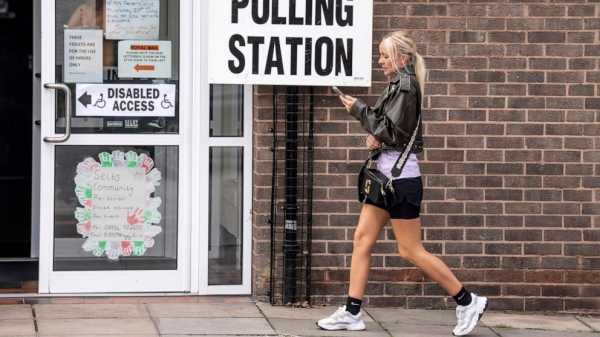
LONDON — Voters went to the polls Thursday in three electoral districts of England, with the governing Conservative Party braced for a drubbing over a cost-of-living crisis and a morale-sapping string of political scandals.
The elections for House of Commons seats are being closely watched because they let voters in three distinct areas of England — a small town in the north, the rural southwest, and the London suburbs — deliver a verdict on the party that has governed Britain since 2010, ahead of a national election due next year.
Three opinion polls this week gave the left-of-center Labour Party a lead of at least 15 points over the Conservatives nationwide.
Prime Minister Rishi Sunak told Conservative lawmakers the three by-elections would be a “tough battle,” but said he still thought the party could win the next general election.
“I promise you we can do this, but we can only do it together as one team,” he told the fractious Conservative caucus on Wednesday evening.
The special elections are part of the still-rippling shockwaves from the turbulent term of ex-leader Boris Johnson. He quit as a lawmaker last month, almost a year after resigning as prime minister, when a standards watchdog concluded he’d lied to Parliament about lawbreaking parties in his office during the coronavirus pandemic.
An ally followed Johnson out the door, and another lawmaker has resigned amid sex and drugs allegations, triggering the three by-elections.
Labour hopes to win Johnson’s old seat of Uxbridge and South Ruislip in suburban London, as well as the mixed urban-rural Selby and Ainsty constituency vacated by Johnson ally Nigel Adams in northern England. The centrist Liberal Democrats are favored to win in southwest England’s Somerton and Frome, whose Conservative legislator, David Warburton, quit over allegations of cocaine use and sexual misconduct.
Labour leader Keir Starmer will face pressure of his own if the party doesn’t win Johnson’s old seat, where the Conservatives are focusing on a divisive local issue – a pollution-cutting levy on older gas-powered and diesel vehicles introduced by London’s Labour Mayor Sadiq Khan.
A trio of Conservative defeats would increase grumbles that Sunak is failing to turn the party’s fortunes around after the mayhem caused by the scandal-plagued Johnson. The last time a governing party lost three by-elections in one day was in 1968 under Labour Prime Minister Harold Wilson.
Sunak became prime minister after being selected leader of the governing party in October. He inherited an economy reeling from the brief term of ex-Prime Minister Liz Truss, who quit after six weeks in office when her tax-cutting economic plans drove up the cost of government borrowing and hammered the pound.
That worsened a cost-of-living crisis that has seen the Bank of England hike its central interest rate at 13 consecutive meetings, to 5%, in a bid to tame inflation that is falling but remained at a still-high 7.9% in the year to June. Four in 10 renters say they are struggling to pay the rent and millions of homeowners face steep increases in their mortgage payments.
The soaring cost of living has driven hundreds of thousands of public sector workers, including doctors and nurses, out on strike, worsening pressure on the overstretched public health care system.
Bad results in Thursday's voting could prompt Sunak to shake up his government with a Cabinet shuffle – currently penciled in for September – as early as Friday.
Polls in the three areas close at 10 p.m. (2100GMT), with results expected early Friday.
Sourse: abcnews.go.com






